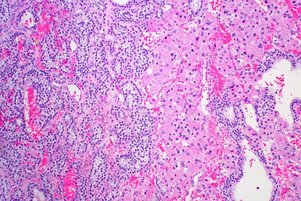|
The down and dirty answers to life's most difficult endocrine questions Thyroid Storm & Beta-blockersThyroid storm, a clinical diagnosis in patients with hyperthyroidism, presents with fevers, tachycardiac/atrial fibrillation, congestive heart failure, and agitations or seizures. Treatment typically includes beta-blockers for symptomatic control. Should a patient in thyroid storm with heart failure receive beta-blockers? In patients who have heart failure secondary to thyroid storm, beta-blockers can significantly reduce cardiac index, and beta-blockers have been found to increase mortality in patients in acute thyroid storm, particularly propanolol. Theoretically, heart failure in thyroid storm is linked to increased heart rate, and patients presenting with mild to moderate heart failure may improve with a beta-blocker that has cardio-selective properties. If the etiology of heart failure is not secondary to the thyroid storm, beta-blockers should be used cautiously, starting with a short-acting BB such as Esmolol. Proanolol, which would have little cardiac effects comparatively, may be avoided. Methimazole vs. PTUBoth methimazole and propylthiouracil (PTU) are used to treat hyperthyroidism. Although less teratogenic, PTU has a blackbox warning for hepatotoxicity. Methimazole has less risk of hepatotoxicity, however is more teratogenic. To compare these drugs, Japanese researchers randomized 396 patients with Graves hyperthyroidism to receive 15 mg of methimazole once daily, 30 mg of methimazole daily (given as 15 mg twice daily), or 100 mg of PTU three times daily. Transaminase elevations and leukopenia occurred less commonly with both doses of methimazole than with PTU. Rash was less common with lower-dose methimazole than with higher-dose methimazole or PTU. A 2007 Journal Watch recommendation found that methimazole was superior overall, and lower doses seemed sufficient for patients with mild-to-moderate hyperthyroidism. Those who are pregnant should be considered for PTU therapy given the teratogenicity of methimazole. Is bicarb level a reliable indicator of severity of DKA?Nah. Consider beta-hydroxybuterate levels if available in your hospital. Should you bolus insulin in DKA patients?"Equivalence testing revealed no clinically relevant differences in IVF change, rate of change of glucose, or AG. Administration of an initial bolus dose of insulin was not associated with significant benefit to patients with DKA and demonstrated equivalent changes in clinically relevant endpoints when compared to patients not administered the bolus."
0 Comments
Leave a Reply. |
Categories
Archive
February 2018
Please read our Terms of Use.
|
||||||

